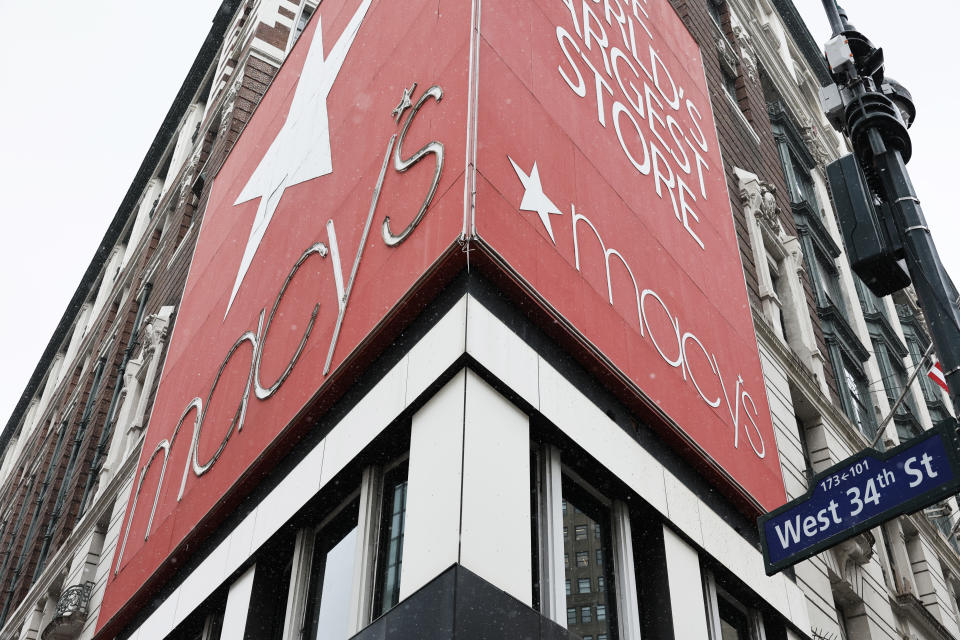Macy’s (M) is navigating through some stormy weather to kick off the year.
The once darling department store faces an uncertain future after it rejected a buyout offer from one of its shareholders, Arkhouse and its partner Brigade Capital Management, on Sunday.
Macy’s cited financing issues as a reason for the rejection, while Arkhouse said it has a letter from investment bank Jefferies Group that backs up its ability to raise funds. Neither side will elaborate on what the money concerns are.
However, Gavriel Kahane, a managing director at Arkhouse, told Bloomberg TV that the investment firm would be willing to share more about its financing or up its offer if Macy’s would sign a non-disclosure agreement and give the firm access to due diligence information. Macy’s said in its release that it isn’t open to either request.
The original proposal, made on Dec.1, would see the company go private for $21.00 per share, a 32% premium to Macy’s share price then.
The 165-year-old department store now has to contend with the risk of letting a good offer by, while trying to turn around its flagging business. If Macy’s is open to offers, there are three options, per veteran executive and retail expert Jan Kniffen.
Akrhouse can come back with a higher bid, another potential buyer offers more, or someone can pitch a plan with “better financing opportunity,” he told Yahoo Finance LIVE.


While Arkhouse hasn’t disclosed the details of its financing plan, a high amount of leverage could be detrimental to retail companies, Kniffen said.
TD Cowen managing director Oliver Chen agreed the financing concerns are “feasible”, considering the “high interest rate environment.” Chen puts the likelihood of this deal still going forward at less than 40%; however, Arkhouse might have bigger motives at play.
“What they’ve done no matter what [is] drawn a lot of attention to Macy’s, and kind of forced everyone to analyze….how the real estate’s quite valuable,” Chen told Yahoo Finance, adding another suitor could come knocking given the newfound realization. Now the company needs to take clear steps to maximize shareholder value, including “re-outlining” specific plans on real estate.
Macy’s real estate alone could be worth $8.5B, according to Kniffen. Others told Yahoo Finance in December it could be worth even more, many opining that its robust real estate portfolio is likely the target of the buyout.
A new owner could strip out or sell off Macy’s valuable assets, eventually leaving it a shell of its former self.
“To some degree, Macy’s board and management needs to be concerned about that this is going to ultimately end up in a Sears situation,” said Morningstar analyst David Swartz.
Arkhouse’s plan to unlock value would likely mean a “very different trajectory for Macy’s,” said Neil Saunders, GlobalData’s managing director of retail. The company is one of the last department stores standing. JCPenney, Lord & Taylor, Stage Stores, Bon-Ton, Belk, and Sears have closed roughly 1,500 locations since 2018, per JP Morgan.
Near-term investors focused on a higher stock price may see the renewed attention on Macy’s as a potential positive, according to Chen.
However, the bigger problem is that shareholders are not currently benefiting from Macy’s real estate portfolio, like its flagship location at New York City’s Herald Square, says Swartz.
While the company beat modest estimates in its latest quarterly earnings results, its stock, before the announcement of the buyout bid in December, was down 45% compared to five years ago.
As of Monday, shares are still down 28% compared to five years ago. Its competitors Nordstrom and Kohl’s are down more than 60%. Macy’s may come to regret passing on this offer if the trend continues.
“They don’t want to be in a situation where two years from now people are regretting that they didn’t take an offer, or at least not necessarily take it at least consider it,” said Swartz.
In 2018, Nordstrom rejected a buyout offer from the Nordstrom family that valued the company at $50 per share, which was below its trading price at the time.
Its stock is now trading at less than $20. “There’s risk in not pursuing these offers,” Swartz said, adding that going private could allow Macy’s to make “major changes” to its declining business model.
And the company may have another battle coming — the director nomination window for its board opened on Saturday and closes on Feb. 19, according to proxy filings.
Saunders said Arkhouse “could use the nomination process to get some people or backers onto Macy’s board.” There is “no guarantee of success,” and doing so would “likely create some hostility with Macy’s management.”
Regardless of the buyout, Macy’s future will likely look very differently from now. Last week, it laid off over 2,300 workers, or 3.5% of its workforce — a sign that its holiday season and 2024 outlook aren’t very strong, according to Swartz.
The company is also in the midst of a leadership change, as Bloomingdales CEO Tony Spring plans to take the helm in February from Jeff Gennette, who has been CEO since 2017.
Some of its moves, like opening smaller store formats and shuttering less productive stores, are on the right track, says Kniffen. Yet, more are needed to increase shareholder returns, such as differentiating its stores, engaging younger consumers, and launching a marketplace, per Chen.
But it’s clear that going forward, Macy’s will be playing for survival.
“If the industry keeps going the way that it has been going, then you do have to wonder if [Macy’s] is going to be viable in the long term. We’re seeing competition, like the rise of Shein,” said Swartz.
“The whole apparel/ retail industry is changing rapidly and it’s not moving towards department stores.”
—
Brooke DiPalma is a senior reporter for Yahoo Finance. Follow her on Twitter at @BrookeDiPalma or email her at [email protected].















